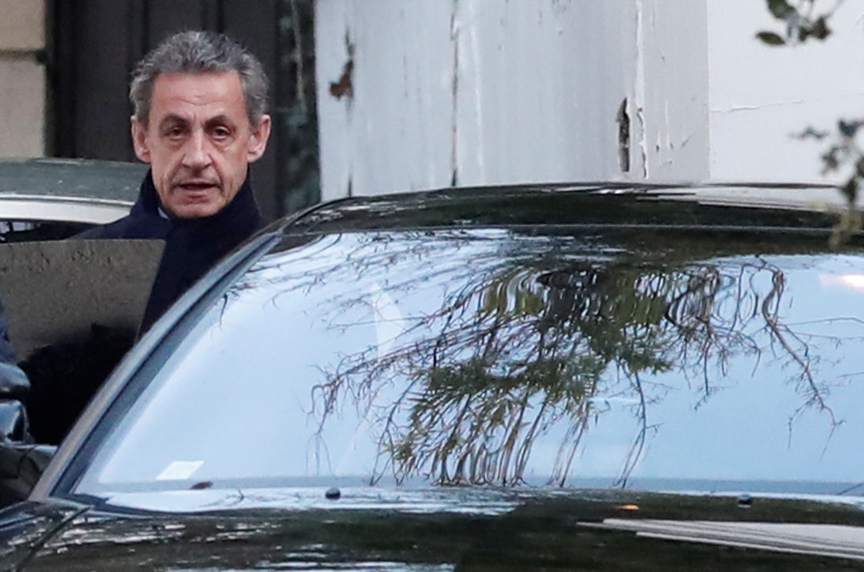
Former French president faces probe over campaign funds
Commentators and analysts have long wondered about the speed with which France acted to support rebels that rose up against Moammar Gadhafi, Libya’s longtime leader, in the spring of 2011.
The official narrative sees Henry Bernard-Levy, the French philosopher and opinion maker, as playing a pivotal role in pushing then French President Nicolas Sarkozy to assume a proactive position on intervention to protect the citizens of Libya’s eastern city of Benghazi.
The Qatari network Al Jazeera, meanwhile, produced an incredible amount of fake news about the “massacres” of innocent civilians by Gadhafi’s regime. These unverified reports clearly had an impact on the French strategy of bringing about regime change in Libya. In fact, Sarkozy relied on these reports to refer Gadhafi to the International Criminal Court accusing him of being a war criminal. The court complied and issued statements condemning the Libyan leader and demanding his arrest.
A main consequence of this blacklisting of Gadhafi was that it prevented then Italian Prime Minister Silvio Berlusconi from supporting his friend, Gadhafi, and facilitating negotiations between the regime and the rebels.
It now turns out that Sarkozy’s motivation for intervening in Libya may have been dictated not by a sense of solidarity with the rebels in Benghazi and the “right to protect,” but by other more mundane reasons.
The former French president is facing an investigation over charges that he allegedly accepted millions of euros in campaign funds from Gadhafi. Sarkozy, who served as president from 2007 to 2012, was released on bail on March 21 following two days of interrogations in police custody.
Could the necessity to silence Gadhafi be the major motivation for Sarkozy’s military intervention? Possibly, but it is more probable that this was just one of many reasons that played a role in the decision to attack Gadhafi.
There is the issue of the human rights embarrassment of Sarkozy and his first wife, Cecilia, at the time they intervened to free Bulgarian nurses imprisoned by Gadhafi; there is the larger issue of France having been denied a privileged position in the allocation of important works in Libya. There is Gadhafi’s role in many African states where French interests are paramount. There is also the feeling that France was caught flat-footed following the first uprisings of the Arab Spring in Tunisia and it wanted to take on a more proactive role in Libya.
What is clear is that Sarkozy wanted regime change in Libya. The French air force conducted raids on sites in the Libyan capital Tripoli where Gadhafi and his family were presumed to be hiding. Gadhafi’s youngest son, Saif-al Arab, and three of the Libyan leader’s grandchildren were killed in one of these airstrikes.
How did the French know about the existence of these secret refuges? It turns out that they were informed by Nuri Mesmari, Gadhafi’s former chief of protocol. Mesmari had defected to France before the uprising exploded. This fact in and on itself would be enough to determine the real intentions of France and later of its allies. Much harder to answer are the questions about the reasons for Sarkozy’s actions. After all, he had received the Libyan leader in Paris a year before the uprisings in Benghazi with full honors and thanked him for his role in fighting Islamic radicalism.
What changed? What until now has only been a rumor shrouded in a conspiracy theory—that Gadhafi contributed a considerable amount of money to Sarkozy’s electoral campaign—has gained more credibility as is apparent from the actions of the French judiciary. The magistrates have found enough evidence that Sarkozy received undeclared foreign financial contributions for his campaign.
What are the consequences of the French investigators’ findings regarding Sarkozy’s malfeasance? It will undoubtedly taint France’s role in Libya. France will probably have to reduce its intervention in Libya and withdraw its engagement in the negotiations between the various factions in the North Africa nation. This would be unfortunate especially because the negotiations undertaken by the United Nations have stalled. The UN envoy Ghassan Salamé needs the support of all international actors to get Libya back on the road to normalcy. France, one of the most influential players in Libya, is without doubt critical part of that effort.
Karim Mezran is a senior fellow in the Atlantic Council’s Rafik Hariri Center for the Middle East. Follow him on Twitter @MezranK.
Image: Former French President Nicolas Sarkozy was seen entering his car outside his home in Paris, France, on March 21. (Reuters/Benoit Tessier)
